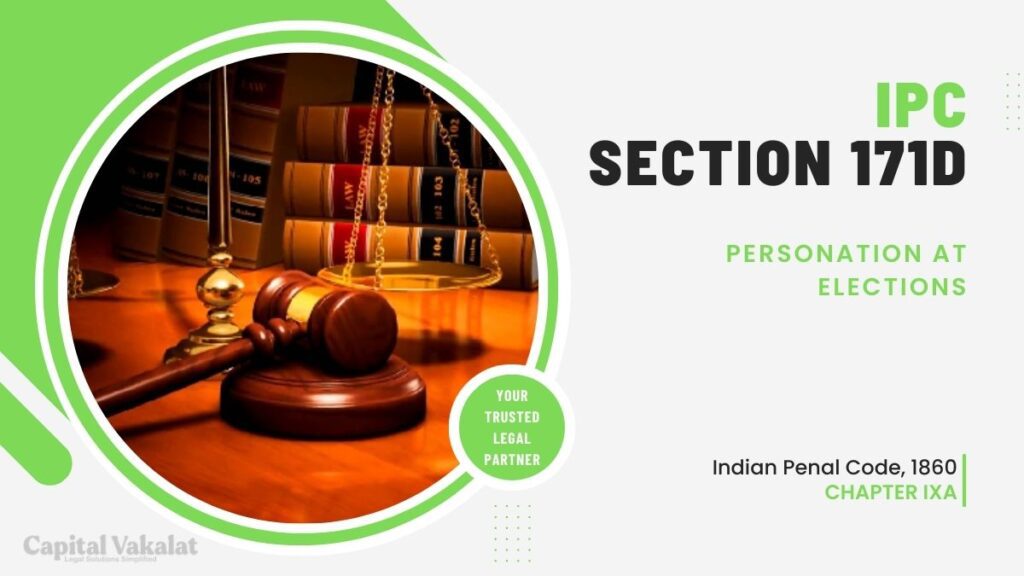Elections are the cornerstone of any democratic nation, representing the voice of the people. It is imperative to ensure that these elections are conducted fairly and without any interference. One such interference is ‘Personation’ at elections, a serious offense covered under Section 171D of the Indian Penal Code (IPC).

In this article, we will delve into the details of Section 171D IPC, its legal implications, detection, prevention, and the challenges it poses.
The Importance of Fair Elections
Fair elections are the bedrock of democracy, ensuring that the chosen representatives truly reflect the will of the electorate. Any attempt to manipulate or interfere with this process threatens the very essence of democracy. Section 171D IPC is designed to combat one such threat, which is personation.
What Constitutes Personation in Elections
Personation, in the context of elections, refers to the act of impersonating another voter or casting a vote on behalf of another person, living or dead, with the intention of influencing the election results. It is a criminal act and carries severe penalties.
Penalties for Personation
Section 171D IPC specifies that anyone found guilty of personation can face imprisonment for a term which may extend to one year or a fine, or both. This legal provision sends a clear message that personation is a grave offense, with potentially life-altering consequences for the guilty party.
Historical Context of Section 171D IPC
Section 171D IPC has its roots in India’s colonial past when the British Raj introduced it as a measure to protect the integrity of elections. Over the years, the law has evolved to reflect the changing needs of a democratic India.
How Personation is Detected
Detecting personation is a challenging task, as it often happens discreetly. The Election Commission, with the help of vigilant citizens and officials, relies on various mechanisms like voter ID checks, facial recognition technology, and other preventive measures to identify cases of personation.
Reporting Suspected Cases
If a voter suspects personation or any electoral malpractice, they are encouraged to report it immediately to the local authorities or the Election Commission. This prompt reporting is vital in maintaining the sanctity of the election process.
The Role of the Election Commission
The Election Commission plays a crucial role in preventing personation at elections. It ensures the smooth functioning of the electoral process by implementing strict guidelines, supervising the conduct of elections, and providing training to election officials.
Voter Education and Awareness
Preventing personation also requires the active participation of the voters themselves. Voter education and awareness campaigns are run by the Election Commission to inform citizens about the electoral process and how to recognize and report suspicious activities.
Notable Incidents of Personation
Over the years, there have been instances of personation in various elections across India. These cases emphasize the need for continued vigilance and strict enforcement of electoral laws.
Challenges in Prosecution
The prosecution of personation cases can be challenging due to the discreet nature of the crime. Collecting concrete evidence and ensuring a fair trial are some of the challenges that law enforcement and the judiciary face.
Conclusion
In conclusion, Section 171D IPC serves as a bulwark against personation at elections, ensuring that the voice of the people remains unadulterated. Fair and transparent elections are the cornerstone of a healthy democracy, and it is our collective responsibility to uphold their sanctity.
Frequently Asked Questions
What are the penalties for personation in elections?
Penalties for personation can include imprisonment for up to one year, a fine, or both.
How can personation be detected at elections?
Personation can be detected through mechanisms like voter ID checks, facial recognition technology, and vigilance of election officials.
What is the role of the Election Commission in preventing personation?
The Election Commission plays a crucial role in preventing personation by implementing strict guidelines, supervising elections, and providing voter education.
Why is it important to report suspected cases of personation?
Reporting suspected cases of personation is vital in maintaining the integrity of the election process and ensuring fair and transparent elections.